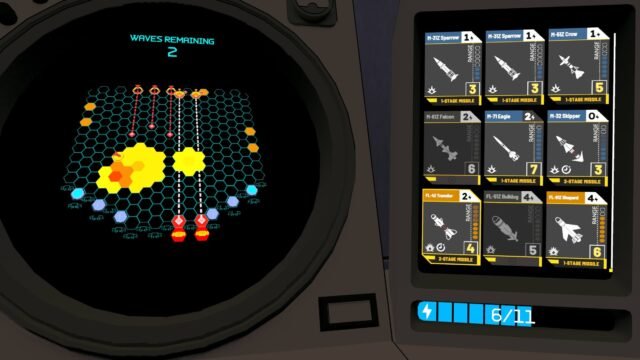Missile Command Delta is a new take on a classic 1980s Atari arcade game. I saw a trailer and was immediately captivated by what looked like an ingenious reimagining of the brilliant but archaic original’s gameplay. I couldn’t wait to get stuck in.
So you can imagine my disappointment when the game turned out to be a tepid, poorly written first-person narrative game, in which I listlessly poked around an abandoned bunker, solving tedious puzzles, and chatting with my character’s shallow, stereotypical friends. Only occasionally did I get to play an excellent new missile command game.
The original Missile Command may be the ultimate Cold War video game, or at least its purest expression. Intercontinental ballistic missiles rain down from the top of the screen toward six cities at the bottom. Using a trackball, you aim your own missiles to detonate in their path, hoping to catch the incoming projectiles in the coruscating bloom of your missile’s explosion. Playing the game, you are in a frenzied defensive state, erecting a fragile and temporary barrier against the constant threat of nuclear destruction raining down from above.
Missile Command is one of the classic designs from the early days of video games. But it’s been more resistant to revival than contemporaries like Pac-Man, in part because its control scheme doesn’t map well to buttons or sticks. (A mouse works better—I remember a version for the original Apple Macintosh—but it’s arguably too easy.) Tasked with Atari’s modern remake, developers 13h Games and Mighty Yell came up with an ingenious solution: turning it into a turn-based tactical puzzle game.
In Missile Command Delta , the playing field is now a hex-based board. Each turn, you receive enemy missile trajectories and can launch up to three missiles from your arsenal in defense. Missiles come in many different types, presented as cards, with different ranges and energy costs. One-stage missiles detonate this turn, while two-stage missiles will make two turns to reach their destination. Upon detonation, they create a seven-hex flower-shaped fireball that will destroy any enemy (or friendly, for that matter) missiles in range or attempting to pass through their blast radius that turn.
It’s a wonderfully efficient and absorbing design that works just as well in the puzzle-like training missions, which have carefully curated attack patterns and missile decks to use, as it does in the more free-form real-life missile strikes. All Missile Command Delta needed to do was give me as many of these missions to play as the designers could create.
Unfortunately, someone decreed that this clever homage to a 45-year-old minimalist arcade game needed to have a story. And that the story should be about a bunch of teenagers who break into a seemingly abandoned military bunker, decades after its last use, just as an extremely geopolitically vague war begins. And that the story should be delivered in the tired form of a first-person puzzle mystery, in which you scramble through drawers for key items and study the many scattered memos for clues.
I kind of like the attempt to build a more modern framework around Missile Command’s Cold War theme, and indeed, the meta reference to the game’s own age. Discovering and playing it on old computers with giant, circular CRT screens in a dusty bunker is a cool idea. It’s the one idea the game needed—though “needed” is a stretch, because the crisp design of the tactics game speaks so succinctly for itself. The concept would also have worked much better in a more period-specific setting, especially considering the story’s nods to ’80s children’s movies like The Goonies and, especially, 1983’s Wargames, in which a young hacker accesses a military supercomputer and brings the world to the brink of World War II.
The real issue, however, is Delta’s lackluster execution of the missile command mystery first-person shooter— Blue Prince it is not—and the pointlessness of its inclusion in the first place. 13h Games and Mighty Yell pile on an original, distinctive game and lump it into a spinoff and spinoff that plays like a legion of other indie wannabes. It’s a dilution of something special and shows a sad lack of confidence in the game’s core idea.
Not every game design needs a narrative framework; not every story needs to be a J.J. Abrams-style mystery box. The original Missile Command, as basic as it was, told a story about the pervasive fear of the late 20th century that was powerfully resonant in its time and will be remembered far longer than this one.

















